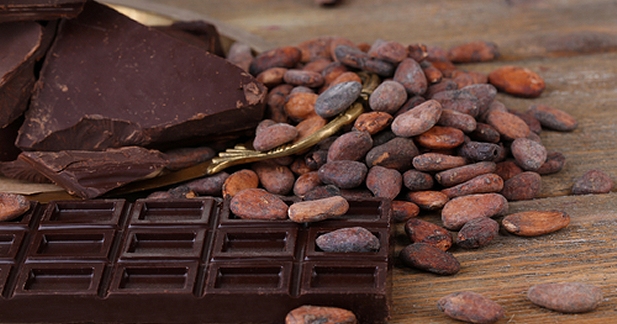
5 Surprising Health Benefits of Eating Chocolate
July 15, 2016
Many studies indicate that chocolate is a healthy food, but not all chocolate is created equal. The health benefits of chocolate are found in the cocoa content, so low-cocoa chocolate foods will have little beneficial effects.
In addition to lacking sufficient amounts of cocoa, white and milk chocolate also contain more sugar, further diluting the health benefits of cocoa.
A dark chocolate bar of at least 70% cocoa is best if you’re going for health and for flavor—though you may wish to go darker if you have an adventurous palate.
1) Nutritional Value
Dark chocolate made of 70 to 85 percent cocoa solids contains 11 grams of soluble fiber and a variety of minerals. In a 3.5 ounce (or 100 gram) bar, dark chocolate contains:
- Manganese-98 percent of the RDA
- Copper-89 percent of the RDA
- Iron-67 percent of the RDA
- Magnesium-58 percent of the RDA
Each bar also contains phosphorus, potassium, selenium and zinc. The fat content includes saturated, monounsaturated and polyunsaturated fats. You should also be aware that a candy bar of this size also provides 600 calories.
Cocoa also contains caffeine and theobromine, but the quantities are insignificant compared to a cup of tea or coffee.
2) Enhances Blood Circulation
Cocoa contains chemical compounds known as flavonols, which stimulate the lining in arteries to produce and release a gaseous compound called nitric oxide.
Nitric oxide, or NO, acts as a vasodilator and relaxes the blood vessels, which decreases blood pressure.
Studies have shown that even small quantities of NO—quantities small enough to be created by flavonol-rich cocoa—had enough of a vasodilative effect to efficiently decrease blood pressure to safe levels.
3) Decreases Risk of Cardiovascular Disease
In addition to playing a small role in blood pressure regulation, dark chocolate contains antioxidants and other compounds that inhibit the formation of LDL, or bad cholesterol. These compounds have been shown to increase life-expectancy and reduce risk of cardiovascular diseases.
Researchers studied more than 450 elderly gentlemen over the course of 15 years. The men eating chocolate two or more times weekly lowered their risk of developing cardiovascular diseases, and were less likely to die from cardiovascular complications.
4) Provides UVB Protection
While dark chocolate is not a substitute for wearing sunscreen when outdoors, research does suggest that flavonols offer some protection against the damaging rays of the sun.
The compounds help protect the skin by increasing surface blood circulation, by maintaining hydration and by increasing skin density.
One study found that after regularly consuming dark chocolate for three months, research volunteers suffered 15–20% less skin damage compared to the control group.
5) Improves Brain Function
Along with increased blood flow to the brain, studies suggest that the flavonols, caffeine and theobromine in dark chocolate may improve cognitive function.
Volunteers given dark chocolate compounds demonstrated a number of cognitive improvements over their peers who had been given a placebo or white chocolate. Mood, visual information processing, and reaction time were all improved by dark chocolate consumption
While chocolate lovers have new reasons to adore their favorite confection, there is a catch...
In order to gain the benefits of cocoa or dark chocolate without over indulging, nutritionists advise that chocolate fans limit intake to approximately one 1.6 ounce bar of high quality, dark chocolate per day.
 Want Healthier? Add Wine!
Want Healthier? Add Wine!
Red wine is healthy too. What happens when you combine chocolate and wine? Health, flavor, and fun! The CUO Chocolate and Wine Tasting Guide will show you how to pair chocolate and wine for amazing experiences of your own or with friends.
- 5 Surprising Health Benefits of Eating Chocolate - July 15, 2016

